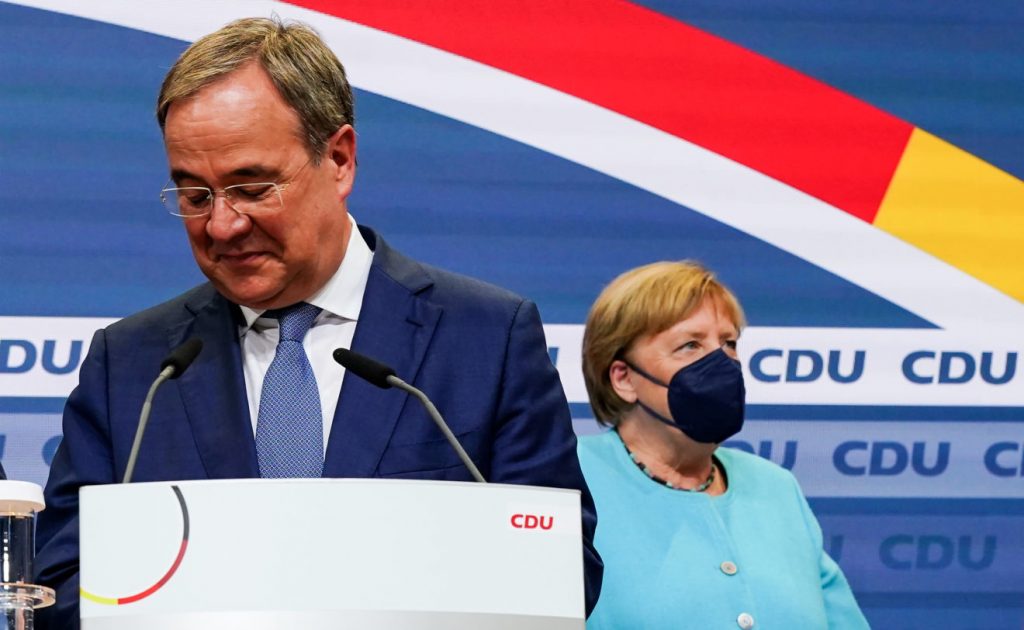On Sunday, voters in Germany elected a new Bundestag or parliament. This marked the end of Angela Merkel’s 16 years as chancellor, as she is not running for election. Her party, the Christian-Democratic Union (CDU), suffered a historic defeat. They lost 8.9 percent of their voters compared to the last elections four years ago, landing at just 24.1 percent. These are the CDU’s worst results in the history of the Federal Republic of Germany. The CDU has washed out. Angela Merkel, who received fervent applause at party headquarters, has left behind a shattered party. The conservatives’ desperate election campaign in the final weeks before the vote was entirely focused on the vague specter of a “government led by the Left,” showed the Union’s complete aimlessness after Merkel’s stepping down. The party was dragged down by its numerous corruption scandals and its dithering candidate Armin Laschet, even if the final results were slightly better than they were in recent polls.
As had been expected, the Social Democrats (SPD) emerged as the clear winner with 25.7 percent — a boost of more than 5 percent compared to their historically bad results from 2017. The SPD won more than half a million votes from former voters of the Left party DIE LINKE. In the campaign, SPD candidate (and Merkel’s vice-chancellor) Olaf Scholz promised mild reforms such as a minimum wage of 12 euros per hour. The SPD’s promise of continuity with Merkel’s policies appears to have worked — many voted for the SPD as a lesser evil in comparison to Laschet and the CDU. It is still far from certain that this result will halt the SPD’s long decline. (Until two decades ago, the party got results of 40 percent or more.) Olaf Scholz as Finance Minister under Merkel was a prophet of “the black zero,” meaning balanced budgets and austerity measures. Before that, as mayor of Hamburg, he was responsible for the police repression during the G20 summit. Even if he enters the chancellery, he will not represent a new face for Germany’s oldest party.
Although the SPD wasn’t able to generate much enthusiasm, the party to their left — DIE LINKE — still lost many votes. With just 4.9 percent, the party lost over 4 percent of the total vote compared to the last election, and was close to being ejected from the parliament entirely. There is a 5 percent hurdle to enter the Bundestag, but there is an exception for parties that win three direct mandates, which DIE LINKE won in Berlin and Leipzig. During the campaign, the party leadership pandered to the SPD and the Greens like never before, and their strategy of trying to form a “red-red-green” coalition has failed resoundingly. Lead candidate Dietmar Bartsch admitted that DIE LINKE was “no longer a representative of the East.” DIE LINKE originally emerged from the old ruling Stalinist party of East Germany, and had long been a mass party in a region devastated by capitalist restoration. Yet the party’s participation in numerous state governments, where “left-wing” ministers implement neoliberal policies, has discredited “The Left” in the eyes of the working class and the oppressed. This is why the party’s appeals to form a national government with an “immediate program” of weak reforms could only lead to a defeat.
A red-red-green coalition containing DIE LINKE is now short of a majority. For the party co-chair Susanne Henning-Wellsow (who is herself part of a neoliberal government coalition at the state level), the terrible result is a product of the fact that DIE LINKE has been in the opposition for the last 30 years. Of all people, it was Sahra Wagenknecht — a prominent Left Party politician who is a social chauvinist and “left conservative” — who declared publicly that the exclusive orientation on joining a government was the reason for their electoral defeat. One thing is clear: DIE LINKE is not seen as a party of social movements — it is perceived as part of the regime, and was penalized by voters for this.
The Greens were far behind their poll results back in spring, when they were briefly the most popular party. With 14 percent, they nonetheless got the most support in the party’s history. Green candiate Annalena Baerbock’s initial reaction was euphoric: “We have a mission for the future!” Given her cozy relationship with the German car industry, the mission in question is selling millions of new electric cars and forcing workers to pay for the climate crisis. The Greens’ electoral results are not nearly high enough to win the chancellery, but the party could nonetheless play the role of kingmaker. They could form a “traffic light coalition” (red-green-yellow, so the SPD, the Greens, and the FDP) or also a “Jamaica coalition” (black-green-yellow, like the Jamaican flag, so the CDU, the Greens, and the FDP).
The far-right Alternative for Germany (AfD) got 10.3 percent of votes — a decline of 2.3 percent compared to their results from 2017. This racist party was able to consolidate its base, winning most direct mandates in the south-eastern province of Saxony. And this is despite the fact that their racist slogans did not get as much traction as they had four years ago, when a so-called “migration crisis” dominated the news. The AfD won support from Covid-19 denialists, called Querdenker. The party under Alice Weidel has courted support from neo-fascists.
The AfD lost fourth place to the FDP, which combines neoliberal economic policies with social liberalism. FDP leader Christian Lindner could be the next finance minister in a coalition with the SPD and the Greens — or with the CDU and the Greens, but long negotiations between parties are to be expected. This is a relative novelty in the Federal Republic of Germany, which has never had more than two parties in a national government.
Sunday also saw state elections in the province of Mecklenburg-Western Pomerania in the northeast and in Berlin. In “MV,” the social democrats got 39.5 percent, doing much better than they did at the national level. In Berlin, the SPD also won, but with just 21.4 percent of the vote, they were not far ahead of the Greens. In the capital, it is not clear if the current red-red-green coalition will continue.
The big shock of the evening was a referendum in Berlin that went against the policies of all the neoliberal establishment parties. 56.4 percent of voters said “Ja” to the expropriation of the city’s biggest landlords. The campaign Deutsche Wohnen und Co. enteigenen calls for companies that own more than 3,000 housing units to pass into public ownership. However, the leaders of the SPD and the Greens have announced their intention to ignore the results of the referendum (even though a majority of their members are in favor). So actual expropriation will depend on militant struggles in the streets.
DIE LINKE showed that their strategy of pandering to Scholz and the SPD in order to join a national government cannot win much support. If “The Left” presents itself as a copy of the social democrats, then it is obvious that many people will pick the original. By desperately appealing to the SPD and the Greens, they have again failed to build an alternative capable of fighting for change. Instead of using the parliament as an avenueto support struggles, they are a government party in Berlin that opposes the legitimate demands of striking healthcare workers.
The new government — whether led by the CDU or the SPD — will carry out attacks against workers, women, young people, and immigrants. We need a big campaign to connect these different struggles, while simultaneously taking steps to build a revolutionary alternative, based on internationalism and class struggle. DIE LINKE’s leadership has supported NATO and social cuts — and their policies have clearly been rejected by voters.
This article was published in German right after the September 26 elections on Klasse Gegen Klasse.
Translation and update: Nathaniel Flakin











